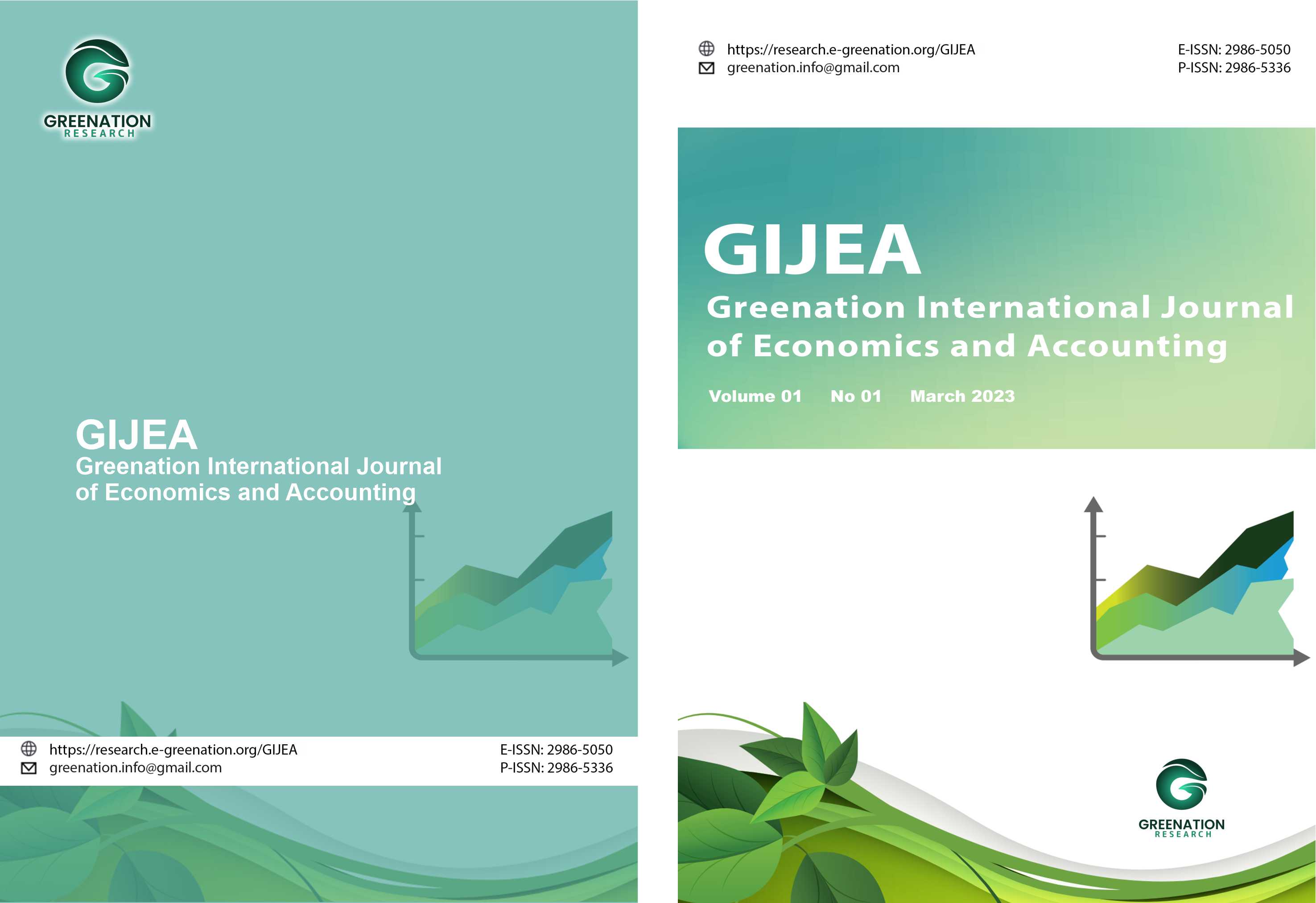Implementation of Green Accounting to Increase Awareness Environment and Knowledge in East Cirebon Region (Case Study of Beverage MSME Business Actor)
DOI:
https://doi.org/10.38035/gijea.v2i1.161Keywords:
Green Accounting, Global Warming, Environmental Concern and KnowledgeAbstract
The negative impacts of global warming and climate change increase the need for environmental improvement efforts. Green accounting in the East Cirebon region is considered to have strategic potential to increase environmental awareness and public knowledge of environmental issues. Green accounting includes an approach that incorporates ecological values into the traditional accounting system to provide a comprehensive understanding of the impact of the economy on the environment. The purpose of this study was to determine the impact of the application of green accounting on increasing environmental awareness and public knowledge in the East Cirebon region. This research uses a qualitative approach with descriptive qualitative methods through in-depth interviews, observations, surveys, and distributing questionnaires to small and medium enterprises. The results showed that the application of green accounting in the East Cirebon region had a positive impact on increasing environmental awareness. By presenting accounting information that considers the environment, people can understand the economic impact of their activities on local ecosystems. In addition, increased environmental awareness will lead to active participation in conservation programs and raise awareness of the importance of sustainability. Applying green accounting also helps increase community knowledge and support sustainable conservation efforts in the East Cirebon region. This study concludes that applying green accounting in the East Cirebon region can positively contribute to increasing environmental awareness and community knowledge. Therefore, local governments, businesses, and communities should work together to continue and expand the application of green accounting to achieve sustainable regional development.
References
Chairia, C., Br Ginting, J. V., Ramles, P., & Ginting, F. (2022). Implementasi Green Accounting (Akuntansi Lingkungan) Di Indonesia: Studi Literatur. Financial: Jurnal Akuntansi, 8(1), 40–49. https://doi.org/10.37403/financial.v8i1.368
Chasbiandani, T., Rizal, N., & Indra Satria, I. (2019). Penerapan Green Accounting Terhadap Profitabitas Perusahaan Di Indonesia. AFRE (Accounting and Financial Review), 2(2), 126–132.
https://doi.org/10.26905/afr.v2i2.3722
Dhar, B. K., Sarkar, S. M., & Ayittey, F. K. (2022). Impact of social responsibility disclosure between implementation of green accounting and sustainable development: A study on heavily polluting companies in Bangladesh. Corporate Social Responsibility and Environmental Management, 29(1), 71–78. https://doi.org/10.1002/csr.2174
Dura, J., & Suharsono, R. (2022). Application Green Accounting To Sustainable
Development Improve Financial Performance Study In Green Industry. Jurnal Akuntansi, 26(2), 192–212. https://doi.org/10.24912/ja.v26i2.893
Farhan, A. (2021). Isu-isu akuntansi modern. In Teori Akuntansi - Perjalanan Filosofis Akuntansi dan Teori Menuju Praktik.
Gonzalez, C. C., & Peña-Vinces, J. (2023). A framework for a green accounting system-exploratory study in a developing country context, Colombia. Environment, Development and Sustainability, 25(9), 9517–9541. https://doi.org/10.1007/s10668-022-02445-w
Helmi, Hafrida, Kusniati, R., Syam, F., Fathni, I., Hartati, & Najwan, J. (2020). Legal protection to manage forest resources based on local wisdom. Journal of Critical Reviews, 7(9), 623–627. https://doi.org/10.31838/jcr.07.09.123
Lubis, H. Z., & Diani, A. (2018). Analisis Penerapan Akuntansi Lingkungan (Green
Accounting) Dalam Pengelolaan Limbah Perusahaan. Proceedings KN APPPTMA Ke-8, 1–7. http://www.appptma.org/wp-
content/uploads/2019/07/39.978-623-90018-0-3.pdf
Maama, H., & Appiah, K. O. (2019). Green accounting practices: lesson from an emerging
economy. Qualitative Research in Financial Markets, 11(4), 456–478. https://doi.org/10.1108/QRFM-02-20170013
Nurlatifah, S. E. S., & Siburian, J. A. (2021). Pengaruh Return on Equity Dan Debt To Total Assets Ratio Terhadap Earning Per Share (Studi Empiris Pada Perusahaan …. Jurnal Akuntansi Dan …, 8(c). https://ojs.ekonomi-unkris.ac.id/index.php/JABK/article/view/508
Rahmadhani, I. W., & Suhartini, D. (2021). Pengaruh Green Accounting dan Kepemilikan Saham Publik terhadap Kinerja Keuangan dengan Pengungkapan CSR Sebagai Variabel Intervening pada …. … Dan Keuangan, 4(1), 132–146. http://journal.ikopin.ac.id/index.php/fairvalue/article/view/585%0Ahttps://journal.ikopin.ac.id/index. php/fairvalue/article/download/585/429
Rounaghi, M. M. (2019). Economic analysis of using green accounting and environmental accounting to identify environmental costs and sustainability indicators. International Journal of Ethics and Systems, 35(4), 504–512. https://doi.org/10.1108/IJOES-03-2019-0056
Smangele Nzama. (2023). Influence Of Barriers To Environmental Sustainability On
Environmental Management Accounting In The Food And Beverage Manufacturing Firms Smangele Nzama 1 , Odunayo Magret Olarewaju 2 , Omolola A ARISE. 832–841.
Tisna, R. D. A., Diana, N., & Afifudin. (2020). Pengaruh Penerapan Green Accounting Terhadap Profitabilitas Perusahaan Manufaktur yang Terdaftar di BEI Tahun 2015-2018. E-Jra, 09(01), 17–28.
Yasrawan, K. T., & Werastuti, D. N. S. (2022). Bagaimana Peran Dan Penerapan Akuntansi Hijau Di Indonesia? Jurnal Akuntansi Kontemporer, 14(3), 151–161. https://doi.org/10.33508/jako.v14i3.3514
Downloads
Published
How to Cite
Issue
Section
License
Copyright (c) 2024 Setia Wati

This work is licensed under a Creative Commons Attribution 4.0 International License.
Copyright :
Authors who publish their manuscripts in this journal agree to the following conditions:
- Copyright in each article belongs to the author.
- The author acknowledges that the GIJEA has the right to be the first to publish under a Creative Commons Attribution 4.0 International license (Attribution 4.0 International CC BY 4.0).
- Authors can submit articles separately, arrange the non-exclusive distribution of manuscripts that have been published in this journal to other versions (for example, sent to the author's institutional repository, publication in a book, etc.), by acknowledging that the manuscript has been published for the first time at GIJEA.
























